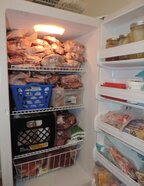|
Myths About Freezing Foods By Pierre Mouchette | Bits-n-Pieces You Can Freeze All Foods
While it is true that most edibles freeze under the right conditions, some should never see the inside of your freezer. Delicate vegetables like lettuce practically disintegrate when frozen and then thawed. The USDA advises not to freeze canned goods or eggs in their shell. You Can Freeze Foods Indefinitely This is true from a food-safety standpoint, but quality suffers the longer the food is frozen. The following are several guidelines from the USDA on how long to keep food in the freezer (at 0 degrees F) for optimum freshness:
How you store the food will lengthen or shorten its freezer life. Air combined with moisture is the enemy of frozen food (freezer burn), so if you can keep those two elements out, you will give your frozen foods a longer life. Enter the vacuum sealer; it sucks the air from the packaging, so foods last longer than if they are just stored in plastic bags or their original packaging. Freezing Kills Bacteria Freezing foods renders bacteria inactive but does not kill anything. If your food goes into the freezer contaminated, it will still harbor the same harmful bacteria once thawed. Cooking food to its recommended temperature is the only way to ensure that your food is safe. Frozen Food Has Fewer Nutrients Than Fresh The opposite can be true. Frozen fruits and vegetables might be more healthful than some of the fresh produce sold in supermarkets because they are more likely to be processed at peak ripeness, a time when, as a rule, they are most nutrient-packed. If you are worried about the nutrient loss, eat your frozen fruits and veggies soon after purchase. Nutrients in frozen vegetables will eventually degrade. Finally, steam or microwave rather than boil your produce to minimize the loss of water-soluble vitamins. Thawed Food Cannot Be Refrozen Without Cooking It First Wrong, you can freeze and refreeze as long as the food has not been left outside for 2 hours or 1 hour in 90-degree heat. A point to be aware of is that refreezing anything uncooked, especially meat, will degrade the quality due to moisture loss in thawing. Although it is technically safe to eat, it is best to avoid refreezing from a culinary standpoint. You Can Store Frozen Food Long-Term In Your Freezer or Anywhere That Is Cold The freezer door is a handy place to store frozen items but not the best location for long-term storage. The temperature near and on the door changes every time the door is opened. Although the food can remain frozen, opening the door creates the possibility of ice crystals forming inside the food and destroying its integrity. And if the power goes out, do not open the freezer door! According to the USDA, a filled freezer should remain frozen for two days. Comments are closed.
|
Archives
May 2024
|
